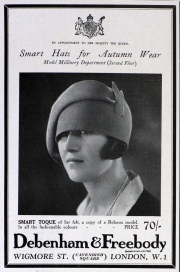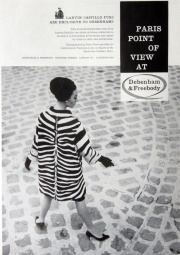Difference between revisions of "Debenham and Freebody"
| Line 33: | Line 33: | ||
of Wigmore Street, London, W1, Drapers, Silk Mercers, Mourning Warehousemen, Dress, Costume, and Mantle Makers, Lacemen, Jewellers, and Dealers in Works of Art, Outfitters, Milliners, Furriers (1914) | of Wigmore Street, London, W1, Drapers, Silk Mercers, Mourning Warehousemen, Dress, Costume, and Mantle Makers, Lacemen, Jewellers, and Dealers in Works of Art, Outfitters, Milliners, Furriers (1914) | ||
1791 Business established<ref>The Times Feb. 7, 1928</ref>, by a Mr. Flint. | |||
1813 The style of the firm was [[Clark and Debenham]] | 1813 The style of the firm was [[Clark and Debenham]] | ||
Revision as of 10:59, 7 August 2020
of Wigmore Street, London, W1, Drapers, Silk Mercers, Mourning Warehousemen, Dress, Costume, and Mantle Makers, Lacemen, Jewellers, and Dealers in Works of Art, Outfitters, Milliners, Furriers (1914)
1791 Business established[1], by a Mr. Flint.
1813 The style of the firm was Clark and Debenham
William Debenham (1794-1863) built up a thriving business as silk mercer and draper. He took his son William into the business; his sons, Henry (1827-1898) and Frank (1837-1917), became clerks in the business; his third son, John became an engineer.
The idea of selling small amounts of fabrics to dressmakers was first introduced by Frank and almost all the fashionable dressmakers flocked to his store. By the 1850s Debenhams had become the fashionable fabric business.
1863 Present title assumed.
1868 The firm was described as Silk Mercers, of 44, Wigmore-streei, in the county of Middlesex, and of Cheltenham,[2]
By 1871 Frank seems to have been in charge of the business[3]
1876 Dissolution of the Partnership between William Debenham, Frank Debenham, and George Edwin Hewett, carrying on business as Silk Mercers and General Ware-housemen, at Cheltenham, in the county of Gloucester, under the firm of Debenham and Freebody, as from the 1st day of August, 1876.[4]
Frank Debenham expanded the retail sales at Wigmore Street; he also developed a considerable wholesale and export trade. A wholesale millinery department was instituted and a factory opened at Luton, as well as departments devoted to costumes, silks, gloves, ribbons, and tulles.
Expansion also took place through the acquisition of a number of specialist retailers and manufacturers of fabrics and draperies.
By 1881 William had retired from the business[5]
The firm acquired the business of Helbronners Ltd., embroiderers
1900 The warehouse part of the business was put into a separate company, Debenham and Co
1904 Acquired G. W. Jones printers.
Held several Royal Warrants
Frank's son, Ernest (1865-1952), aided by his barrister friend Frederick Oliver, oversaw a number of significant developments in the fortunes of the business. Two separate limited companies were registered in 1905: Debenhams Ltd was formed to own Debenham and Freebody, along with Debenham and Co. (wholesalers, manufacturers, and shippers).
1906 The architects William Wallace and James Gibson designed a grand new store for the London premies.
1912 Frank Debenham retired as chairman, replaced by Ernest, with Frederick Oliver as his deputy.
See Also
Sources of Information
- Biography of Sir Ernest Debenham, ONBD



























